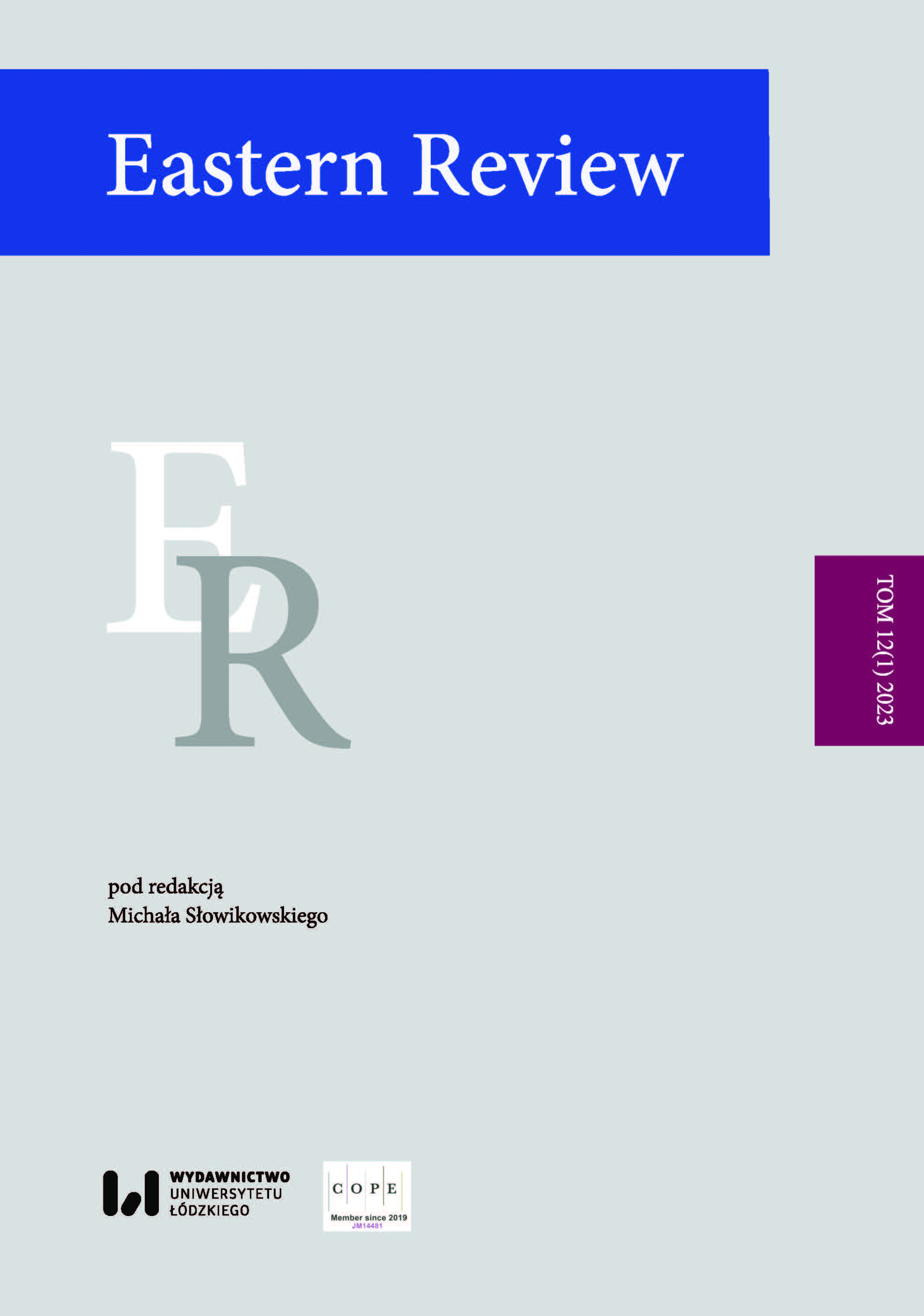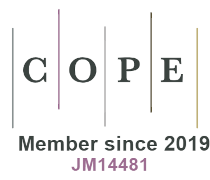Myśl społeczno-polityczna i aktywizm Bhimrao Ramji Ambedkara
DOI:
https://doi.org/10.18778/1427-9657.12.04Słowa kluczowe:
Indie, polityka, filozofia polityczna, Ambedkar, dalici, dyskryminacjaAbstrakt
Celem artykułu jest analiza dorobku politycznego Ambedkara i jego roli w kształtowaniu systemu politycznego Indii na przełomie lat 50. i 60. XX w. Jest to studium filozofii politycznej na podstawie licznych publikacji, jakie po sobie pozostawił, a także przegląd reformatorskich idei i postulatów społeczno-politycznych, które konsekwentnie głosił w ciągu swojego życia. Ważne miejsce w niniejszym artykule zajmuje działalność Ambedkara na rzecz osób wykluczonych i dyskryminowanych ze względu na przynależność kastową (jāti).
Bibliografia
Ambedkar, B.R. 1946. Pakistan or the Partition of India. Mumbai: Thacker & Co, https://mea.gov.in/Images/attach/amb/Volume_08.pdf (dostęp 30.12.2022).
Google Scholar
Ambedkar, B.R. 1982. Annihilation of Caste XXIII, https://ccnmtl.columbia.edu/projects/mmt/ambedkar/web/readings/aoc_print_2004.pdf (dostęp 5.06.2024).
Google Scholar
Ambedkar, B.R. 1984. What Congress and Gandhi Have Done to the Untouchables. Bombay: Thacker & Co.
Google Scholar
Ambedkar, B.R. 1987. Philosophy of Hinduism. T. 3, https://www.mea.gov.in/Images/attach/amb/Volume_04.pdf (dostęp 5.06.2024).
Google Scholar
Ambedkar, B.R. 2005. Buddha or Karl Marx. New Delhi: Critical Quest.
Google Scholar
Ambedkar, B.R. 2008. Writings and Speeches: A Ready Reference Manual. D.C. Ahir (red.). B.R. Publishing Corp.
Google Scholar
Ambedkar, B.R. 2011. The Buddha and His Dhamma: A Critical Edition. India: OUP India, https://www.google.pl/books/edition/The_Buddha_and_His_Dhamma/FIAyDwAAQBAJ?hl=en&gbpv=1 (dostęp 30.12.2022).
Google Scholar
Ambedkar, B.R. 2014. Buddha and the Future of His Religion, BAWS, t. 17, nr 2, https://www.clearviewproject.org/2015/05/buddha-and-the-future-of-his-religion-ambedkar/ (dostęp 5.06.2024).
Google Scholar
Ambedkar, B.R. 2020. Dr Babasaheb Ambedkar Writings and Speeches (BAWS). T. 1–17, Mumbai (1982–2003): Government of Maharashtra, Department of Education.
Google Scholar
Ambedkarite Today Team, Dr. Bhimrao Ambedkar family [आंबेडकर कुटुंब], https://www.ambedkaritetoday.com/2020/04/ambedkar-family.html (dostęp 5.06.2024).
Google Scholar
Basham, A.L. 1973, Indie od początku dziejów do podboju muzułmańskiego. Warszawa: PIW.
Google Scholar
Begari, J. (red.). 2021. BR Ambedkar and Social Transformation: Revisiting the Philosophy and Reclaiming Social Justice. Taylor & Francis. https://doi.org/10.4324/9780429356759
Google Scholar
DOI: https://doi.org/10.4324/9780429356759
Benjamin, J. 2009. B.R. Ambedkar: An Indefatigable Defender of Human Rights. Focus, June (56), https://www.hurights.or.jp/archives/focus/section2/2009/06/b-r-ambedkar-an-indefatigable-defender-of-human-rights.html (dostęp 5.06.2024).
Google Scholar
Bose, R. 2022. Politics of Appropriation: Why Ambedkar’s Legacy Matters. Outlook, 18.10, https://www.outlookindia.com/national/politics-of-appropriation-why-ambedkar-s-legacy-matters-news-230605 (dostęp 23.02.2023).
Google Scholar
Browarczyk, M. 2019. Narrating Lives, Narrating Selves. Women’s Autobiographies in Hindi. Kraków–Poznań: Jagiellonian University. https://doi.org/10.12797/9788381380799
Google Scholar
DOI: https://doi.org/10.12797/9788381380799
Chatterjee, P. 2006. B.R. Ambedkar and Troubled Times of Citizenship. W: Mehta, V.R., Pantham, T. (red.). Political Ideas in Modern India: thematic explorations. New Delhi: Sage.
Google Scholar
Das, J. 2018. Babasaheb Dr. B.R. Ambedkar’s Contribution to Nation Building. Odisha Review, January, s. 67–73, http://magazines.odisha.gov.in/Orissareview/2018/Jan/engpdf/67-73.pdf (dostęp 25.01.2023).
Google Scholar
Dewey, J. 1890. On Some Current Conceptions of the Term ‘Self’. Mind 15, https://brocku.ca/MeadProject/Dewey/Dewey_1890.html (dostęp 13.01.2023).
Google Scholar
Divya, A. 2022. How Ambedkar Circuit is good tourism and good politics for the BJP. Indian Express, 23.09., https://indianexpress.com/article/explained/explained-culture/how-ambedkar-circuit-is-good-tourism-and-good-politics-for-the-bjp-8165181/ (dostęp 23.02.2023).
Google Scholar
Dr BR Ambedkar family, Dhamm Bharat, https://www.dhammabharat.com/eng/dr-br-ambedkar-family/#Ambedkar_Family_background (dostęp 21.01.2023).
Google Scholar
The Famous People. B.R. Ambedkar, Biography, https://www.thefamouspeople.com/profiles/b-r-ambedkar-3657.php (dostęp 25.01.2023).
Google Scholar
Financial Express. 2017. IANS, Dalits Who Converted to Buddhism Better Off in Literacy and Well-Being: Survey, 2.07., https://www.financialexpress.com/india-news/dalits-who-converted-to-buddhism-better-off-in-literacy-and-well-being/745230/ (dostęp 20.01.2023).
Google Scholar
Gokhale, P.P. 2008. The Philosophy of B R Ambedkar. Pune: Sugava.
Google Scholar
The Hindu. 2022. PM Modi a true follower of Ambedkar, says Ram Nath Kovind, 17.09., https://www.thehindu.com/news/national/modi-a-true-follower-of-ambedkar-says-kovind/article65900070.ece (dostęp 23.02.2023).
Google Scholar
Human Rights Watch. 2014a. “They say we’re dirty:” Denying an education to India’s marginalized, 22.04., https://www.hrw.org/report/2014/04/22/they-say-were-dirty/denying-education-indias-marginalized (dostęp 22.01.2023).
Google Scholar
Human Rights Watch. 2014b. Cleaning human waste: “Manual scavenging,” caste, and discrimination in India, 25.08., https://www.hrw.org/report/2014/08/25/cleaning-human-waste/manual-scavenging-caste-and-discrimination-india (dostęp 22.01.2023).
Google Scholar
Human Rights Watch. 2021. World Report 2021: Events of 2020, January, https://www.hrw.org/sites/default/files/media_2021/01/2021_hrw_world_report.pdf (dostęp 22.01.2023).
Google Scholar
Jaffrelot, C. 2009. Dr. Ambedkar’s Strategies Against Untouchability and the Caste System, Working Paper Series on Indian Institute of Dalit Studies 3(4).
Google Scholar
Kapoor, K. 2005. Text and Interpretation: The Indian Tradition. New Delhi: D.K. Printworld.
Google Scholar
Karunyakara, L. 2021. Ambedkar’s Struggle for Independence of India. International Journal of Multidisciplinary Educational Research 10, 3(5), s. 9–12, http://s3-ap-southeast-1.amazonaws.com/ijmer/pdf/volume10/volume10-issue3(5)/2.pdf (dostęp 4.01.2023).
Google Scholar
Keer, D. 1954. Dr. Ambedkar: Life and Mission. Mumbai: Popular Prakashan.
Google Scholar
Keer, D. 1974. Mahatma Jotirao Phooley: Father of the Indian Social Revolution. Mumbai: Popular Prakashan.
Google Scholar
Kita, V., Rajaturai, E.V. 1998. Towards a Non-Brahmin Millennium: From Iyothee Thass to Periyar. Kalkuta: Samya.
Google Scholar
Konstytucja Indii. 2020. https://biblioteka.sejm.gov.pl/wp-content/uploads/2021/02/Konstytucja-Indii-tlumaczenie.pdf (dostęp 2.01.2023).
Google Scholar
Kuczkiewicz-Fraś, A. 2017. Babasahab Ambedkar. Pomocnik Historyczny „Polityki”, 27.06., https://www.polityka.pl/pomocnikhistoryczny/1709424,1,babasahab-ambedkar.read (dostęp 16.12.2022).
Google Scholar
Kumar, K. 2013. Political Philosophy of B.R. Ambedkar: A Critical Understanding (Part 2), https://www.roundtableindia.co.in/political-philosophy-of-br-ambedkar-a-critical-understanding-part-2/ (dostęp 6.01.2023).
Google Scholar
Kumar, R. 1987. Gandhi, Ambedkar and the Poona Pact, 1932. W: Masselos, J. (red.). Struggling and Ruling. New Delhi: Sterling 1987.
Google Scholar
Lista odbiorców nagrody Bharat Ratna, https://www.mha.gov.in/sites/default/files/ListofBRrecepients_09082019.pdf (dostęp 2.01.2023).
Google Scholar
Lista rzeczy nazwanych imieniem B.R. Ambedkara, https://en.wikipedia.org/wiki/List_of_things_named_after_B._R._Ambedkar (dostęp 14.01.2023).
Google Scholar
Maharashtra Navanirman Sena. 2011. Dr. Babasaheb Ambedkar, 10.05., https://web.archive.org/web/20110510041016/https://www.manase.org/en/maharashtra.php?mid=68&smid=23&pmid=1&id=857 (dostęp 2.01.2023).
Google Scholar
Mehta, V., Pantham, R.T. (red.), 2006. Political Ideas in Modern India. New Delhi: Sage.
Google Scholar
Moudgil, M. 2017. Dalits Are Still Converting to Buddhism, but at a Dwindling Rate. The Quint, 17.06., https://www.thequint.com/news/india/dalits-converting-to-buddhism (dostęp 20.01.2023).
Google Scholar
Myrdal, G., Streeten, P. 1958. Value in Social Theory: A Selection of Essays on Methodology. London: Routledge & Kegan Paul.
Google Scholar
Narasu, L.P. 1946. What Is Buddhism. Colombo: Mahabodhi Society.
Google Scholar
Narendra Modi. 2022. PM pays homage to Dr. Babasaheb Ambedkar on Mahaparinirvan Diwas, 6.12., https://www.narendramodi.in/prime-minister-narendra-modi-pays-homage-to-dr-babasaheb-ambedkar-on-mahaparinirvan-diwas-6th-december-twenty-twenty-two-566283 (dostęp 23.01.2023).
Google Scholar
Office Memorandum, Declaration of Holiday on 14th April 2021 – Birthday of Dr. B.R. Ambedkar, 31.03., https://dopt.gov.in/sites/default/files/Ambedkar%20holiday%202021.pdf (dostęp 14.01.2023).
Google Scholar
Office of the Registrar General & Census Commissioner, India (ORGI), Distribution of Population by Religions. 2011. Drop-in-Article: Census of India 4, https://censusindia.gov.in/nada/index.php/catalog/40443/study-description (dostęp 25.01.2023).
Google Scholar
Omvedt, G. 2003. Buddhism in India: Challenging Brahmanism and Caste. New Delhi: SAGE.
Google Scholar
Oza, P. 2020. History of Protest Literature in India: Trails from the Bhakti Literature. International Journal of Interreligious and Intercultural Studies 3(2). https://doi.org/10.32795/ijiis.vol3.iss2.2020.711
Google Scholar
DOI: https://doi.org/10.32795/ijiis.vol3.iss2.2020.711
Parekh, B. 1989. Gandhi’s Political Philosophy: A Critical Examination. London: The Macmillan Press. https://doi.org/10.1007/978-1-349-09248-2
Google Scholar
DOI: https://doi.org/10.1007/978-1-349-09248-2
Parel, A.J. 2006. Gandhi’s Philosophy and the Quest for Harmony. New Delhi: Cambridge.
Google Scholar
Phonsa, R. 2020. Subedar Major Ramji Maloji Sakpal, https://dalitvision.blogspot.com/2020/09/subedar-major-ramji-maloji-sakpal.html (dostęp 10.05.2024).
Google Scholar
Pol, P. 2020. RSS and Ambedkar: A Camaraderie That Never Existed. The Wire, 6.12., https://thewire.in/politics/rss-ambedkar-camaraderie-fictional-narratives (dostęp 2.01.2023).
Google Scholar
Prakash, G. 2022. Why BJP is the rightful heir to the legacy of Ambedkar. The Print, 14.04., https://theprint.in/opinion/why-bjp-is-the-rightful-heir-to-the-legacy-of-ambedkar/915652/ (dostęp 21.01.2021).
Google Scholar
Pyarelal. 1958. The Epic Fast. Ahmedabad: Navjivan.
Google Scholar
Queen, C.S. 1994. Ambedkar, Modernity and the Hermeneutics of Buddhist Liberation. W: A.K. Narain (red.). Dr Ambedkar, Buddhism and Social Change, D.C. Ahir, Delhi: B R Publishing.
Google Scholar
Queen, C.S. 1996. Dr. Ambedkar and the Hermeneutics of Buddhist Liberation. W: C.S. Queen, S.B. King (red.). Engaged Buddhism: Buddhist Liberation Movements in Asia. State University of New York Press. https://doi.org/10.2307/jj.18255500
Google Scholar
DOI: https://doi.org/10.1515/9781438416649
Rakshit, N.B. 1999. Right to Constitutional Remedy: Significance of Article 32. Economic and Political Weekly 34/35, 21.08–3.09., s. 2379–2381, http://www.jstor.org/stable/4408327 (dostęp 25.01.2023).
Google Scholar
Ramesh, R. 2006. Untouchables Embrace Buddha to Escape Oppression. Hyderabad: The Guardian.
Google Scholar
Rao, A. 2010. The Caste Question. Ranikhet: Permanent Black. https://doi.org/10.1525/9780520943377
Google Scholar
DOI: https://doi.org/10.1525/9780520943377
Rathore, A.S., Verma A. 2011. Introduction, The Buddha and His Dhamma: A Critical Edition by B R Ambedkar. New Delhi: Oxford. https://doi.org/10.1093/acprof:oso/9780198068679.001.0001
Google Scholar
DOI: https://doi.org/10.1093/acprof:oso/9780198068679.001.0001
Raut, M. 2016. Why Manusmriti Dahan Divas Is Still Relevant Today, 25.12., https://feminisminindia.com/2016/12/25/manusmriti-dahan-divas-still-relevant/ (dostęp 3.01.2023).
Google Scholar
Rawls, J. 1972. A Theory of Justice. Oxford: Oxford University Press.
Google Scholar
Rodrigues, V. 1993. Making a Tradition Critical: Ambedkar’s Reading of Buddhism, Dalit Movements and the Meanings of Labour. W: P. Robb (red.). India. Delhi: Oxford University Press.
Google Scholar
Rodrigues, V. 2005. Ambedkar on Preferential Treatment. Seminar 549.
Google Scholar
Rodrigues, V. 2017. Ambedkar as a Political Philosopher. Economical & Political Weekly 52(15), 15.04., s. 101–107, https://www.epw.in/system/files/pdf/2017_52/15/SA_LII_15_150417_Valerian%20Rodrigues.pdf (dostęp 16.12.2022).
Google Scholar
Rodrigues, V. 2024. Ambedkar’s Political Philosophy: A Grammar of Public Life from the Social Margins. United Kingdom: OUP Oxford. https://doi.org/10.1093/9780198925422.001.0001
Google Scholar
DOI: https://doi.org/10.1093/9780198925422.001.0001
Sadecki, J. 2016. Rozwój regulacji prawnych w Indiach związanych ze zjawiskiem niedotykalności (Untouchability) na przestrzeni epok: kolonialnej i niepodległościowej. Studia Iuridica 66, s. 329–353.
Google Scholar
Sanskrit Dictionary, Hasło ‘dal’, https://sanskritdictionary.com/?iencoding=iast&q=dal%22&lang=sans&action=Search (dostęp 16.12.2022).
Google Scholar
Saxena, A. 2021. Why BR Ambedkar Burned ‘Manusmriti’ On December 25? The Logical Indian, 26.12., https://thelogicalindian.com/history/br-ambedkar-manusmriti-32813 (dostęp 2.01.2023).
Google Scholar
Shahare, M.L. 1986. Dr. Bhimrao Ambedkar: His Life and Work, https://ncsc.nic.in/files/review%20proforma/Life%20and%20works.pdf (dostęp 23.06.2023).
Google Scholar
Sharma, R., Ambedkar Jayanti: Everything to Know About the Festival for B.R. Ambedkar. 2021, https://www.seema.com/ambedkar-jayanti-everything-to-know-about-the-festival-for-b-r-ambedkar (dostęp 14.01.2023).
Google Scholar
Siddharth Dr. 2020. Dr Ambedkar’s Journalism: from ‘Mooknayak’ to ‘Prabuddha Bharat’. Forward Press, 26.01., https://www.forwardpress.in/2020/01/dr-ambedkars-journalism-from-mooknayak-to-prabuddha-bharat (dostęp 2.01.2023).
Google Scholar
Sinha, S. 2016. ‘The Relevance of Dr Babasaheb Ambedkar – Today and Tomorrow’ by Professor David Mosse, 23.05., https://blogs.soas.ac.uk/ssai-notes/2016/05/23/the-relevance-of-dr-babasaheb-ambedkar-today-and-tomorrow/ (dostęp 23.02.2023).
Google Scholar
Spis ludności Indii. 2011, https://www.census2011.co.in (dostęp 2.01.2023).
Google Scholar
Stasik, D. 2009. Podręcznik języka hindi. Cz. I. Warszawa: Dialog.
Google Scholar
Strona internetowa Bharatiya Janata Party, Shri Bangaru Laxman, https://www.bjp.org/shri-bangaru-laxman (dostęp 23.01.2023).
Google Scholar
Tewari, R., Kaushika, P. 2018, We analysed 1,000 BJP leaders & found the party remains a Brahmin-Baniya club. The Print, 1.08., https://theprint.in/politics/ambedkar-on-its-agenda-but-bjp-has-little-place-for-dalits-is-still-a-brahmin-baniya-party/91449/ (dostęp 21.01.2021).
Google Scholar
Thapar, R. 1981. Dissent and Protest in the Early Indian Tradition. Diogenes 29 (113–114), s. 31–54. https://doi.org/10.1177/039219218102911302
Google Scholar
DOI: https://doi.org/10.1177/039219218102911302
Venkatesan, V. 2000. The Laxman Line. Frontline, 16.09., https://frontline.thehindu.com/cover-story/article30254965.ece (dostęp 23.01.2023).
Google Scholar
Watsjajana Mallanga, Kamasutra, czyli traktat o miłości. 1985. Tłum. M.K. Byrski. Warszawa: Państwowy Instytut Wydawniczy.
Google Scholar
Webster, J.C.B. 1999. Who is a Dalit? W: S.M. Michael (red.), Untouchable: Dalits in Modern India. Boulder, CO: Lynne Rienner. https://doi.org/10.1515/9781685851903-004
Google Scholar
DOI: https://doi.org/10.1515/9781685851903-004
Zelliot, E. 2013. Ambedkar’s world: The making of Babasaheb and the Dalit movement. New Delhi: Navayana Publishing.
Google Scholar
Zilla Parishad Nagpur, https://web.archive.org/web/20130521005841/http://nagpur.nic.in/zpnagpur/English/Tourism1.htm (dostęp 2.01.2023).
Google Scholar
Opublikowane
Wersje
- 2025-02-18 - (2)
- 2025-02-18 - (1)
Jak cytować
Numer
Dział
Licencja
Prawa autorskie (c) 2023 Natalia Zajączkowska

Utwór dostępny jest na licencji Creative Commons Uznanie autorstwa – Użycie niekomercyjne – Bez utworów zależnych 4.0 Międzynarodowe.










